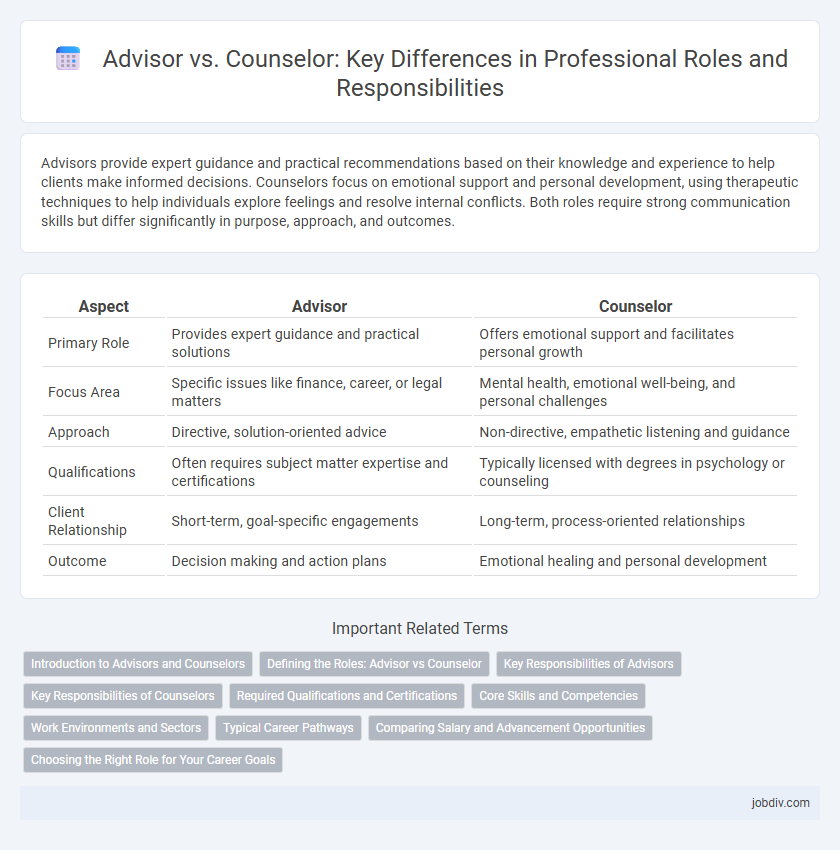Advisors provide expert guidance and practical recommendations based on their knowledge and experience to help clients make informed decisions. Counselors focus on emotional support and personal development, using therapeutic techniques to help individuals explore feelings and resolve internal conflicts. Both roles require strong communication skills but differ significantly in purpose, approach, and outcomes.
Table of Comparison
| Aspect | Advisor | Counselor |
|---|---|---|
| Primary Role | Provides expert guidance and practical solutions | Offers emotional support and facilitates personal growth |
| Focus Area | Specific issues like finance, career, or legal matters | Mental health, emotional well-being, and personal challenges |
| Approach | Directive, solution-oriented advice | Non-directive, empathetic listening and guidance |
| Qualifications | Often requires subject matter expertise and certifications | Typically licensed with degrees in psychology or counseling |
| Client Relationship | Short-term, goal-specific engagements | Long-term, process-oriented relationships |
| Outcome | Decision making and action plans | Emotional healing and personal development |
Introduction to Advisors and Counselors
Advisors provide specialized guidance and strategic recommendations to support decision-making in professional and academic settings. Counselors focus on offering emotional support and mental health assistance to help individuals cope with personal challenges and achieve well-being. Both roles require active listening and interpersonal skills but differ in their primary objectives and methods.
Defining the Roles: Advisor vs Counselor
Advisors primarily provide expert guidance and practical solutions based on specialized knowledge to help clients achieve specific goals, often in academic, career, or financial contexts. Counselors focus on emotional support, mental health, and personal development, facilitating self-exploration and coping strategies through therapeutic techniques. Understanding these distinct roles helps professionals tailor interventions to client needs by recognizing when to offer directive advice or empathetic counseling.
Key Responsibilities of Advisors
Advisors provide expert guidance on decision-making processes, strategic planning, and goal setting within their specialized fields. They analyze client needs, offer tailored recommendations, and monitor progress to ensure alignment with organizational objectives. Advisors also facilitate resource allocation and risk management to optimize outcomes and support long-term success.
Key Responsibilities of Counselors
Counselors primarily focus on providing emotional support, mental health guidance, and crisis intervention to individuals facing personal or psychological challenges. They conduct assessments, develop treatment plans, and facilitate therapy sessions to promote well-being and coping strategies. Counselors also collaborate with other healthcare professionals to ensure comprehensive care and monitor progress over time.
Required Qualifications and Certifications
Advisors typically require a bachelor's degree in fields such as finance, business, or education, with certifications like Certified Financial Planner (CFP) or Certified Academic Advisor enhancing their qualifications. Counselors often hold advanced degrees in psychology, social work, or counseling, and must obtain state licensure such as Licensed Professional Counselor (LPC) or Licensed Clinical Social Worker (LCSW). Both roles demand specialized training, but counselors have stricter credentialing standards due to their focus on mental health and therapeutic interventions.
Core Skills and Competencies
Advisors excel in analytical thinking, strategic planning, and decision-making, guiding clients through complex financial or professional landscapes with expertise in data interpretation and solution formulation. Counselors demonstrate strong empathy, active listening, and emotional intelligence, focusing on clients' mental health, personal development, and problem-solving through supportive communication. Both roles require exceptional interpersonal skills, but advisors prioritize technical knowledge and industry insight, while counselors emphasize psychological understanding and client-centered care.
Work Environments and Sectors
Advisors typically operate in corporate, financial, and academic sectors, providing expert guidance on strategic decisions, investments, or career development. Counselors are more prevalent in healthcare, education, and social service environments, offering support for personal, psychological, or emotional challenges. Work environments for advisors emphasize analytical skills and decision-making, while counselors rely on empathy and communication to assist clients.
Typical Career Pathways
Advisors often follow career pathways in educational institutions, financial services, or corporate environments, progressing from entry-level advisory roles to senior consultant or management positions. Counselors typically advance through clinical or educational settings, obtaining licensure and specializing in mental health, rehabilitation, or career counseling before assuming roles as lead counselors or clinical directors. Both professions require continuous professional development but diverge significantly in specialization and credentialing processes.
Comparing Salary and Advancement Opportunities
Advisors typically command higher salaries than counselors, with median annual earnings ranging from $58,000 to $85,000 compared to counselors' $45,000 to $65,000, reflecting greater specialization in sectors like finance and business. Advancement opportunities for advisors often include roles such as senior consultant, portfolio manager, or director of advisory services, whereas counselors primarily advance to clinical director or supervisory positions within mental health organizations. Salary growth and career progression in advisory roles are frequently tied to certifications like CFA or CFP, while counselors benefit from licensure and advanced degrees for higher-level clinical or administrative roles.
Choosing the Right Role for Your Career Goals
Choosing between an advisor and a counselor depends on your career goals and the type of guidance you need. Advisors typically provide expertise and strategic recommendations in specific fields such as finance, education, or business, helping you make informed decisions. Counselors focus on personal development and emotional support, guiding you through challenges and fostering growth to align your career with your values and aspirations.
Advisor vs Counselor Infographic

 jobdiv.com
jobdiv.com